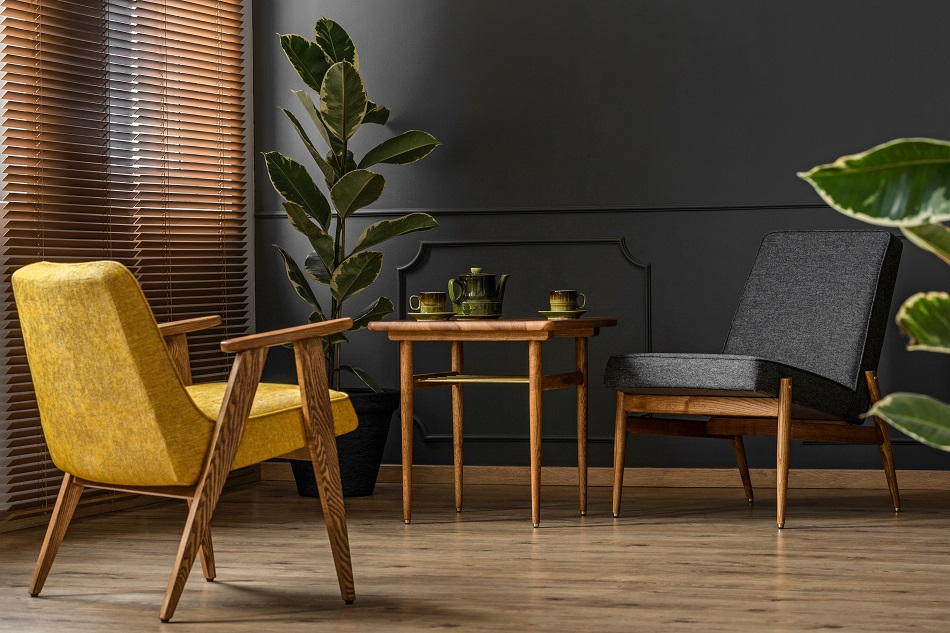
Image Credit: Photographee.eu/Shutterstock.com
When buying furniture, one of the first things to consider is whether the quality and/or sustainability is important.
Good Quality
A good quality item is one that will last you as long as it will take to reproduce the raw materials that go into the construction of that item. Look for a manufacturer's warranty that you can live with. Also, furniture which looks as good on the inside as it does on the outside is a sign of premium quality. Better quality furniture will invariably cost more and is often timeless in style.
On the plus side, your quality piece will last longer and may well appreciate in value. Additionally, it has the benefits of long-term recyclability and reuse.
Mid-Quality
A buyer can pick up mid-quality furniture through many well-known retailers and it often chimes with the current fashion. It’s always good to keep in mind that mid-quality furniture is often not highly sustainable and can end up on the scrap-heap of a passing fad (remember the black-ash hi-fi units and clear glass dining tables of the 1980s).
Although if you like your furniture to have its finger on the high fashion-pulse, it might also be a consideration to look for ethically-made and environmentally-sustainable staples. There are a variety of affordable, eco-friendly furniture options available
Basic-Level
Basic-level furniture can be great if the buyer can’t afford a quality piece and wants an item to tide them over for a short time. For instance, if parents have young children that might outgrow a bed, or the buyer needs a basic item for a spare room.
The main consideration is to not expect too much from an inexpensive piece, as it is made for a functional but short duration. On the down-side, it may be clunky, fall apart quickly or contain many plastics, or are even made of plastic (e.g. plastic dining chairs) which are not environmentally friendly.
Alternatives
There are of course alternatives for the furniture buyer to consider. For instance, consider what it is you wish to buy and the specific uses you want the piece for and go on a second-hand search. There are many good internet platforms or stores where you can find a good-quality piece that will often be less expensive because of its used status. In addition, thinking creatively can be a real plus and a furniture talking point.
For example, yesterday's TV armoires are today's stereo cabinets or old wine crates can be excellent in terms of bookshelves. Up-cycling is always an exciting option too. Also, it is a help in terms of sustainability, reusability, and doing our bit for the planet.
Having a bespoke piece made by a craftsman is sometimes the best way to get exactly what you need, particularly if it needs to fit a difficult space. It’s not always an expensive option.
Background
How do you know that you're really getting a good deal during a furniture store's "Going out of Business Sale"? Follow these tips from furniture craftsman Mark Gatterdam from Hardwood Artisans to ensure you won't have buyer's regret once your new addition comes home.
Shop Locally
Not only will you save on shipping costs by choosing companies who keep their sales and manufacturing processes in a small geographic area, but you'll also help stimulate the local economy.
Look for Quality
A good quality item is one that will last you as long as it will take to reproduce the raw materials that go into the construction of that item. Look for a manufacturer's warranty that you can live with. Also, furniture which looks as good on the inside as it does on the outside is a sign of quality.
Google Your Local Handyman
Look for items that are repairable. Not only is a repair greener for the environment, but it can also be less costly than purchasing a new item.
Think Creatively
Before plunking down your hard-earned money on a gorgeous item, consider any future alternative uses. For example, yesterday's TV armoires are today's bookcases and stereo cabinets.
Get Comfy
Your salesperson is your best resource in a furniture store, and you should not feel obligated to oblige a salesperson who makes you feel uncomfortable.
Don't Settle
Furniture is an investment that should not leave you second-guessing yourself. If you cannot find a piece of furniture that matches your needs, you may find customization to be the best option despite the increase in cost.
This article was updated on 24th February, 2020.
Disclaimer: The views expressed here are those of the author expressed in their private capacity and do not necessarily represent the views of AZoM.com Limited T/A AZoNetwork the owner and operator of this website. This disclaimer forms part of the Terms and conditions of use of this website.